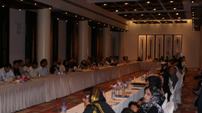 The national reproductive health strategy represents an opportunity for all partners engaged in reproductive health development to maintain the momentum created by the 2010 G8 Muskoka Summit and the UN Secretary General’s ‘Every Woman Every Child’ initiative17 July 2012 – Afghanistan's reproductive health and policy strategy, (2012–2020) was launched by the Reproductive Health Directorate of the Ministry of Public Health on 17 July 2012. Dr Ahmad Shadoul, WHO Representative in Afghanistan, attending the launch said that, “WHO welcomes the efforts of the Reproductive Health Directorate in developing a health policy and strategy representing an integrated and measurable framework to address existing needs, such as strengthening emergency obstetrics, and to address emerging needs, including prevention and care of breast and cervical cancer, the burden of which remains to be determined”.
The national reproductive health strategy represents an opportunity for all partners engaged in reproductive health development to maintain the momentum created by the 2010 G8 Muskoka Summit and the UN Secretary General’s ‘Every Woman Every Child’ initiative17 July 2012 – Afghanistan's reproductive health and policy strategy, (2012–2020) was launched by the Reproductive Health Directorate of the Ministry of Public Health on 17 July 2012. Dr Ahmad Shadoul, WHO Representative in Afghanistan, attending the launch said that, “WHO welcomes the efforts of the Reproductive Health Directorate in developing a health policy and strategy representing an integrated and measurable framework to address existing needs, such as strengthening emergency obstetrics, and to address emerging needs, including prevention and care of breast and cervical cancer, the burden of which remains to be determined”.
Globally, Afghanistan remains among the 25 countries with the highest burden of maternal mortality, hence its inclusion in the global, multi-partner initiative known as H4+. The initiative operates in Afghanistan in partnership with UNICEF, the United Nations Population Fund, the World Bank and WHO to accelerate implementation of maternal and newborn continuum of care, in response to national priorities.



